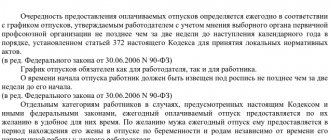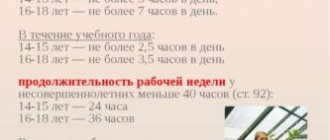Concept of weekly uninterrupted rest
Regulated by Article 110 of the Labor Code, rest for workers each week should not be divided into time periods that do not reach the minimum duration of weekends.
The essence of the concept is that workers can rest from the work process for a certain period between two working weeks. It must be continuous, unconditional, at this time rest is legally defined and regulated. The employer’s obligation to provide all its subordinates with this type of rest every week is enshrined in Part 1 of Article 111 of the Labor Code of the Russian Federation.
Regardless of the length of the working week, Sunday is considered a common day off for all categories of civil servants. The second day off, if it takes place according to the internal rules adopted in this organization, is determined arbitrarily. As a rule, these days are consecutive. This could be Saturday and Sunday, or Sunday and Monday.
The main condition is that the duration of weekly continuous rest reaches the minimum established by regulations.
However, this concept also implies exceptions. This includes cases with employers whose enterprises periodically suspend the work process for technical reasons related to the peculiarities of production activities. This also includes some organizational conditions beyond the control of the manager. For this purpose, Part 3 of Article 111 of the Labor Code provides for the provision that employees of such an enterprise are allowed weekly rest (days off) on different days of the week, in order of priority or in another organizational order.
https://youtu.be/J4ScJbsljuc
What is weekly uninterrupted rest?
This is the period from the end of the last hours of work until the start of the next shift.
The size of such a gap cannot be less than the minimum established by law and its distribution depends on the specifics of the working period, the shift schedule and the duration of one shift. If the recording of working time is carried out in total, then the duration of rest may be less than the legally established period in some weeks, but in general for the reporting period the norm is necessarily observed.
The legislative framework
The provisions on the holiday period are regulated by several legislative acts:
- Art. 106 of the Labor Code of the Russian Federation indicates the concept of a day off, and the ability of a citizen to manage it.
- The main act on the duration of weekly rest is Art. 110 of the Labor Code of the Russian Federation, while the requirements regarding the procedure for providing a period free from duties and its duration are indicated for all employers, without exception, regardless of the form of business.
- In addition to Art. 110 of the Labor Code of the Russian Federation indicates the duration of working hours in Art. 111 and 113 of the Labor Code of the Russian Federation, depending on the number of hours spent on work.
Labor Code of the Russian Federation Article 106. The concept of rest time
Rest time is the time during which an employee is free from performing work duties and which he can use at his own discretion.
Labor Code of the Russian Federation Article 110. Duration of weekly continuous rest
The duration of weekly uninterrupted rest cannot be less than 42 hours.
Find out how to apply for work on weekends here:
https://youtu.be/0jXr4pvN7wM
What is included in this holiday period
Art. 111 of the Labor Code of the Russian Federation determines that Sunday must necessarily be a day off, but with a 5-day working week, any day of the week can be included in Sunday at the discretion of management and enshrined in local acts of the organization.
Labor Code of the Russian Federation Article 111. Weekends
All employees are provided with days off (weekly continuous rest). With a five-day work week, employees are given two days off per week, and with a six-day work week, one day off. The general day off is Sunday. The second day off in a five-day work week is established by a collective agreement or internal labor regulations. Both days off are usually provided in a row. For employers whose work suspension on weekends is impossible due to production, technical and organizational conditions, days off are provided on different days of the week in turn to each group of employees in accordance with the internal labor regulations.
Important: if production is continuous, then another day of the week is provided for release from work, depending on the needs of the enterprise. That is, any day can become a free day instead of Sunday.
In any case, the employee has the right to rest and dispose of the provided hours at his own discretion.
It should be taken into account that the legislator has established a minimum limit for days off, but the maximum is not regulated, this indicates the ability of employers to independently regulate the duration of the weekly weekend period for the state, the main thing is that the minimum is maintained.
Indicator regulation
The duration of the weekend period may vary in accordance with the Regulations on the peculiarities of the working day regime, paragraph 9, for specialists with a special nature of work, working in shifts, as well as with a divided working day.
What a rotating work schedule is and what its features are, you will find out in the link.
In this regard, rest per week can be 24 hours, or it can exceed 42 hours, but at the same time for a month it amounts to the legally established norm.
The concept of days off.
If the accounting of working hours is summarized, then days off for specialists are determined according to the shift schedule, and the norms must be observed.
Here you will learn how to correctly draw up a shift schedule when recording working hours.
For special categories of workers, such as railway workers, sailors, drivers, the work and rest schedule is prescribed in the local regulations of the enterprise.
Involvement in special cases
On weekends, going to work is prohibited on a general basis; this is regulated by Part 1 of Article 113 of the Labor Code. But it is still possible to call someone to work if there are circumstances of special significance. To do this, the manager must comply with no less important formalities under Part 8 of Article 113 of the Labor Code of the Russian Federation - that is, make an order in writing.
All employees called to work must be familiarized with it, under personal signatures. This means the employee’s consent to be hired to work on his legal day off, as enshrined in Part 2 of Article 113 of the Labor Code. This includes cases of the need to perform urgent and unforeseen work, on which the normal functioning of the institution in the future depends.
Without the written consent of the employee, a call to work is also allowed (Part 3 of Article 113 of the Labor Code). These are force majeure circumstances: preventing a production accident or eliminating its results, reducing the impact of a natural or man-made disaster.
As well as urgent work due to the introduction of a state of emergency or martial law. Then the calling procedure becomes as simplified as possible, but also provided for by law.
Also, Part 5 of Article 113 of the Labor Code of the Russian Federation mentions the general rule according to which recruitment to work is possible not only with the written consent of the employee, but also with the involvement of the elected body of the trade union of the enterprise and taking into account its opinion. This includes other cases where the duration of weekly uninterrupted rest becomes shorter than generally accepted.
Article 153 of the Labor Code of the Russian Federation provides for a provision for increased wages for workers if they are involved in activities on weekends.
Basic Concepts
Labor law establishes what the duration of weekly continuous rest should be (Articles 110, 111, 113 of the Labor Code of the Russian Federation). Working time refers to a person’s expenses for the implementation of his labor functions, expressed in hours and minutes. The volume of hours to be worked for a certain period is stipulated in the individual labor agreement; references to internal acts of the enterprise (for example, a collective agreement) are allowed.
Types of schedules, work on which is counted as full-time work activity:
- working days and shifts of standard length;
- shortened working days;
- Performing job duties on a part-time schedule.
Working hours directly affect the minimum duration of weekly rest. They are classified according to the rules for the distribution of hours worked over a single shift or a longer accounting interval:
- working under irregular working hours;
- implementation of a set of job functions in a flexible schedule;
- shift schedule;
- summarized working time recording;
- the working day is divided into several parts.
Rest time is characterized by complete release from official duties. These periods are formed due to the following time ranges:
- weekends – guaranteed weekly rest;
- short breaks during each shift;
- daily rest, which accompanies the end of the working day;
- holidays celebrated at the federal and regional level;
- paid and unpaid leave.
Minimum duration of weekly uninterrupted rest
Any citizen working under an employment contract has the right to a weekly rest from professional activities. The duration of weekly uninterrupted rest must be at least 42 hours. In some cases, it is less time, but this is legal provided that, on average, during the billing period the required minimum weekly break from work for the employee is met.
This regime should be taken into account when drawing up schedules and staffing at any enterprise or organization, as well as for individual entrepreneurship with the hiring of contract workers. The minimum duration of a day off depends on the specifics of the work and the number of employees in the organization.
If the work involves shifts, then it is calculated in shifts, especially if it is a continuous type of production.
It should be noted that the procedure for providing this type of rest to workers in individual industries is somewhat different. This includes railway, road and water transport. Here, the minimum rest period per week is regulated by internal regulations, charter, regulations on working hours and hours of rest.
The work schedule of an individual employee (or category of employees) or an entire department includes not only the number of hours for rest, but also the names of the days off. Weekends should be:
- two days – with a 5-day work week.
- one day - with 6 days.
Moreover, in accordance with Article 95 of the Labor Code, working hours on the eve of a day off, with a 6-day week, are reduced from 8 hours in total to 5 hours.
Weekly uninterrupted rest. Weekend
Previous12131415161718192021222324252627Next
The duration of weekly uninterrupted rest must be at least 42 hours.
The duration of weekly continuous rest is calculated from the end of the work shift on the eve of the day off until the start of work on the next (after the day off) day.
When recording working hours in total, the duration of weekly continuous rest must be observed only for the accounting period (for the specifics of working hours and rest time for civil aviation workers, see Order of the Ministry of Transport of Russia dated January 30, 2004 No. 10).
With a five-day work week, employees are given two days off per week, and with a six-day work week, employees are given one day off.
Providing days off per week is mandatory for the employer. Sunday is considered a general day off. As a general rule, with a five-day work week, days off are Saturday and Sunday, and with a six-day week, Sunday.
If a weekend and a holiday coincide, the day off is transferred to the next working day after the holiday.
For persons working a six-day work week or other work schedules, Saturdays that coincide with holidays are working days. Holidays cannot be transferred.
Article 262 of the Labor Code of the Russian Federation provides for the right of one of the parents of disabled children under 18 years of age (or persons replacing them) to be provided with four additional paid days off per month, which can be used by one of the named persons or divided among themselves at their discretion.
Women working in rural areas are given, at their request, one additional day off per month without pay.
The general day off is Sunday. The second day off in a five-day working week, if it is not defined by law, is established by internal regulations. Both days off are usually provided in a row.
In a five-day work week, the second day off is usually Saturday. If, due to production conditions, it is impossible to provide a second day off on Saturday, then in accordance with shift schedules and internal labor regulations, another day of weekly rest is established.
In organizations in which suspension of work is impossible due to production and technical conditions or due to the need for constant continuous service to the population, as well as in other enterprises with continuous production, days off are provided on different days of the week alternately to each group of workers.
Non-working holidays
In accordance with Art. 112 of the Labor Code of the Russian Federation, non-working holidays in the Russian Federation are: January 1-5 - New Year holidays;
January 7—Christmas Day;
February 23 - Defender of the Fatherland Day;
March 8—International Women's Day; May 1 - Spring and Labor holiday;
May 9 - Victory Day; June 12—Russia Day;
November 4 is National Unity Day.
If a day off coincides with a non-working holiday, the day off is transferred to the next working day after the holiday.
At the same time, wages due to non-working holidays for persons receiving an official salary are not reduced. For other categories of employees, additional remuneration is provided, the amount of which is established by local regulations of the organization or an employment contract.
As a general rule, work on weekends and non-working holidays is prohibited, except in cases provided for by the Labor Code of the Russian Federation.
Involvement of employees to work on weekends and non-working holidays is carried out with their written consent if it is necessary to perform unforeseen work, on the urgent implementation of which the normal work of the organization as a whole or its individual structural divisions or an individual entrepreneur depends in the future.
The law establishes that hiring employees to work on weekends and non-working holidays without their consent is permitted only in the following cases:
1) to prevent a catastrophe, industrial accident or eliminate the consequences of a catastrophe, industrial accident or natural disaster;
2) to prevent accidents, destruction or damage to the employer’s property, state or municipal property;
3) to perform work the need for which is due to the introduction of a state of emergency or martial law, as well as urgent work under emergency circumstances, i.e. in the event of a disaster or threat of disaster (fires, floods, famine, earthquakes, epidemics or epizootics) and in other cases threatening the life or normal living conditions of the entire population or part of it.
Involvement in work on weekends and non-working holidays of creative workers of the media, cinematography organizations, television and video crews, theaters, theatrical and concert organizations, circuses and other persons involved in the creation and (or) performance (exhibition) of works, professional athletes in accordance with the lists of jobs, professions, positions of these workers, approved by the Government of the Russian Federation, taking into account the opinion of the Russian Tripartite Commission for the Regulation of Social and Labor Relations, is allowed in the manner established by the collective agreement, local regulations, or employment contracts.
In other cases, involvement in work on weekends and non-working holidays is permitted with the written consent of the employee and taking into account the opinion of the elected body of the primary trade union organization.
On non-working holidays, it is allowed to carry out work, the suspension of which is impossible due to production and technical conditions (continuously operating organizations), work caused by the need to serve the population, as well as urgent repair and loading and unloading work.
Involvement of disabled people and women with children under 3 years of age to work on weekends and non-working holidays is permitted only if this is not prohibited for them due to health reasons in accordance with a medical report issued in the manner established by federal laws and other regulations legal acts of the Russian Federation.
At the same time, disabled people and women with children under 3 years of age must be informed, upon signature, of their right to refuse to work on a day off or a non-working holiday.
Employees are recruited to work on weekends and non-working holidays by written order of the employer.
Vacations
One of the main types of employee rest time is vacations. All vacations are divided into basic and additional.
Additional ones, in turn, are divided into vacations: with preservation of wages; without pay.
Annual holidays
All employees are provided with annual paid leave while maintaining their place of work and position.
The right to annual paid leave is enjoyed by all persons working under a contract in organizations belonging to any form of ownership, regardless of the degree of employment, place of performance of work duties, position held or work performed, term of the employment contract and form of remuneration.
Seasonal workers and persons working under an employment contract concluded for a period of up to 2 months have the right to vacation and its compensation at the rate of 2 working days per month of work.
All persons working part-time are provided with annual paid leave for combined work or are provided with compensation for unused leave upon dismissal.
Persons working under an employment contract for individual citizens, as well as home-based workers, have the right to leave on a general basis.
Persons serving correctional labor have the right to annual basic leave of 18 working days. Other types of leave are provided to them on a general basis (Article 40 of the Criminal Executive Code of the Russian Federation).
During vacation, the employee himself has the right to submit a letter of resignation at his own request and terminate the employment contract. Dismissal of an employee or his transfer at the initiative of the administration while on regular leave is not allowed (Part 3 of Article 81 of the Labor Code of the Russian Federation), except in cases of complete liquidation of the enterprise.
The agreement of the parties when concluding an employment contract to refuse leave is invalid.
The duration of annual paid leave is 28 calendar days.
The specified norm is a guarantee norm. The duration of annual main leave cannot be less than the specified norm.
Vacation of at least 28 calendar days is provided to all employees, regardless of the degree of employment and whether the job is main or part-time.
Some categories of workers (taking into account their character, working conditions, health status, etc.) enjoy the right to extended leave. These include:
- persons under 18 years of age who have the right to leave of at least 31 calendar days (Art.
Responsibility for reducing weekly rest time
For violation of legal requirements for ensuring minimum rest time, the employer is liable in accordance with Art. 5.27 of the Code of Administrative Offences.
For the first violation of labor legislation, an official may receive a warning; for a repeated violation, he may be disqualified for up to two years. The maximum fine for a legal entity is seventy thousand rubles.
The organization is also responsible for timely familiarization of personnel with properly approved internal labor regulations.
When developing employee work schedules, the employer must take into account labor laws regarding weekly rest. For continuous cycle production, intercity transport drivers, shift workers and a number of other specialties, industry regulations should be additionally taken into account.
Top
Write your question in the form below
Results
The legislator determined the types of rest, its duration, and working time standards. The purpose of this is to ensure that the employer respects the right of employees to rest.
As a general rule, the minimum duration of weekly continuous rest is 42 hours, the maximum is not limited. When recording working hours in total, the minimum can be reduced to 24 hours.
Involvement in work on weekends is possible only with the consent of the employee. The only exceptions are force majeure circumstances.
Article 110 of the Labor Code of the Russian Federation. Duration of weekly uninterrupted rest
This rule must be observed in all organizations, regardless of organizational and legal forms, when establishing working hours and shift schedules. The duration of weekly continuous rest is calculated from the end of work on the eve of the day off until the start of work (shift) on the day following the day off.
In this regard, according to the authors, when determining the duration of such rest, it is the provisions of the Labor Code of the Russian Federation that are subject to application. 2. In a number of cases, the duration of continuous rest is established by separate regulatory legal acts. In accordance with clause 11 of the Resolution of the Council of People's Commissars of the USSR “On working time and rest time in enterprises and institutions switching to a continuous production week,” which is in force insofar as it does not contradict the Labor Code of the Russian Federation, the duration of daily rest (between shifts, etc.
Important
At the same time, for certain categories of workers, as a rule, those having a special nature of work, regulatory legal acts stipulate that, with a cumulative accounting of working time, the duration of weekly uninterrupted rest can be reduced in certain weeks compared to that established by law. However, on average for the accounting period this norm must be met. For example, in accordance with clause 9 of the Regulations on the peculiarities of working hours and rest time for communication workers who have a special nature of work, for workers working in shifts, as well as for workers whose working day is divided into parts, the duration of weekly continuous rest can be more than 42 hours and can be reduced to 24 hours.
But during the accounting period (month, quarter), the duration of weekly continuous rest must be at least 42 hours.
- Important
Labor law
- Protection of employer's rights
- I have a short 6 hour shift at the end of my shift, I ask the employer to reschedule it for another day. On this day I already have a 5 hour shift, and the result is an 11 hour shift.
Initial positions
The duration of weekly continuous rest is regulated in the Labor Code of the Russian Federation (LC RF) by literally three small articles (110, 111 and 113), but this problem should be considered on a much broader scale.
Since all parameters of rest time are closely interrelated with working time, in order to fully understand the intricacies of this issue, it is better to start with the basic concepts. 1. Working hours
This is the period during which a person performs his or her job duties. The duration is determined by the employment contract and internal documents of the organization. There are different types and modes of working hours. The first (working hours of normal duration, reduced, part-time) vary in duration, the second (irregular working hours, flexible schedule, shift work, summed up, dividing the day into parts) are graded depending on the order of distribution of working hours during the day, week or other accounting periods .
2. Rest time
This is the period when a person is free from work. By the way, it also includes the route to and from work. There are several types:
- breaks during the day,
- daily rest,
- weekends (weekly rest),
- holidays,
- vacation.









